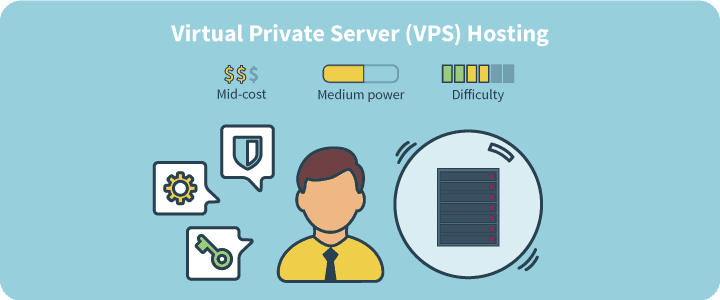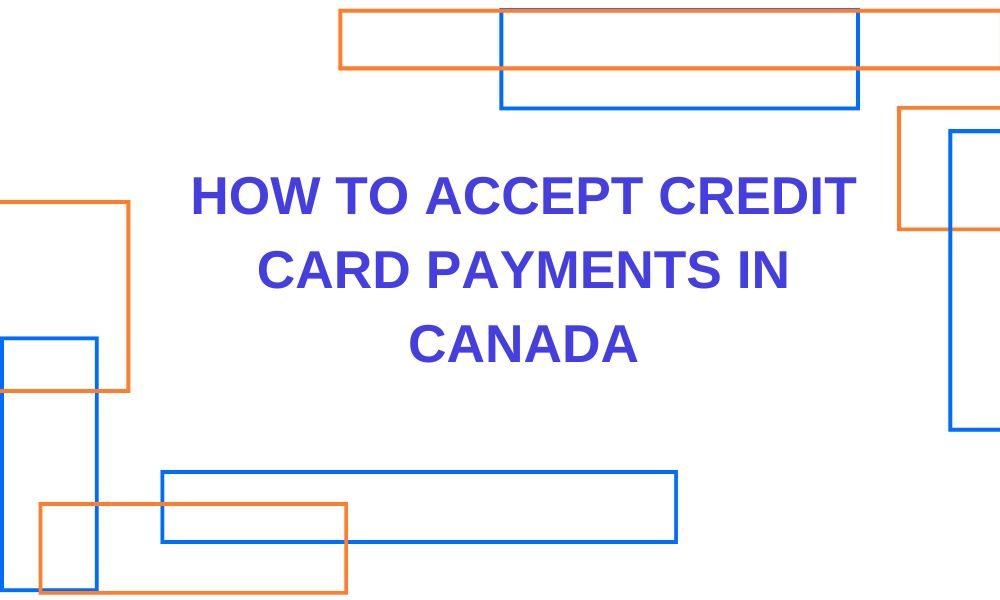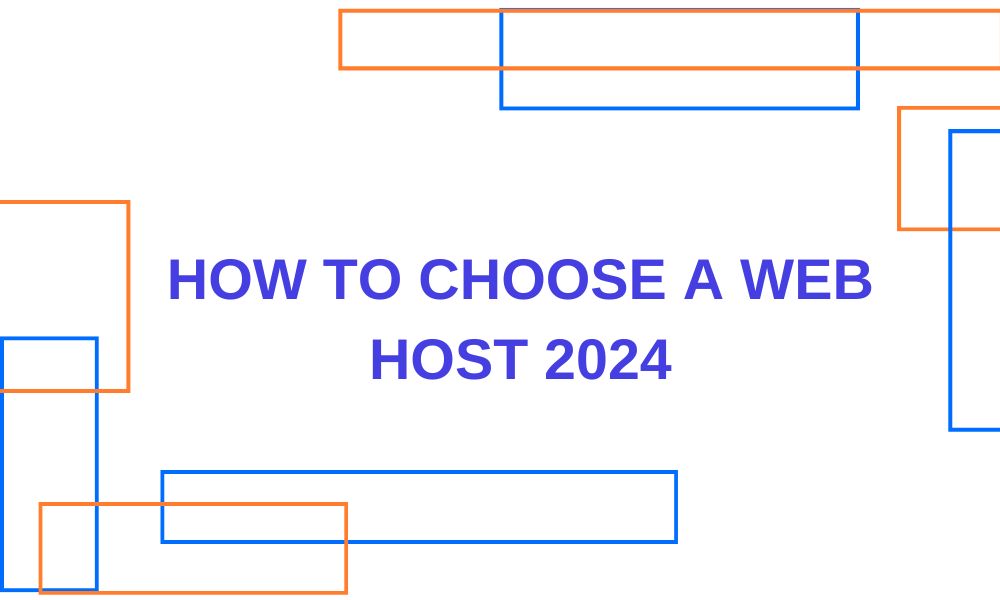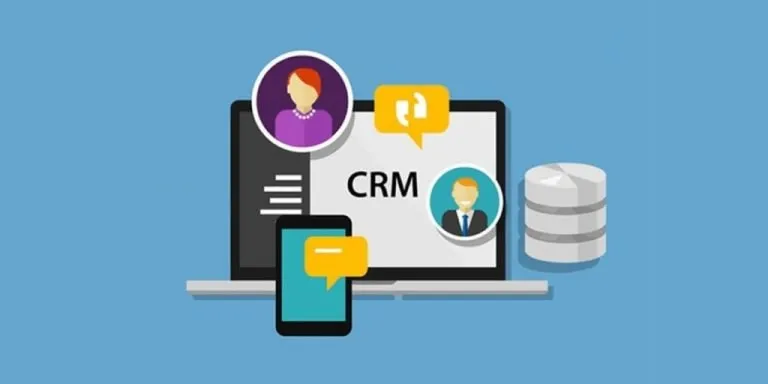Advertising disclosure
Hosting Canada is community-supported. We may earn a commission when you make a purchase through one of our links. Read Disclosure.
A Detailed Breakdown of Website Development Costs
 In this day and age, almost everyone needs a website. If you’re a business, you need a website to connect with your customers; it doesn’t matter whether you’re as big as Walmart or if you’re an entrepreneur starting a small business of your own.
In this day and age, almost everyone needs a website. If you’re a business, you need a website to connect with your customers; it doesn’t matter whether you’re as big as Walmart or if you’re an entrepreneur starting a small business of your own.
Alternatively, you can use a website to connect with fans of your hobby or showcase your hobby’s content online. Plenty more use their own websites as blogs and attract followings, especially if they are freelancers or artists of some kind.
But lots of people don’t fully know what it takes or costs to build a website from scratch. While personal websites are more common than ever, it’s difficult to see all the costs of website development upfront because of how complex the process really is.
In this guide, we’ll dive deep into the overall costs of website development from start to finish and provide a general estimate, so you know what to expect when you decide to make or order your own digital space. Let’s get started!
What Affects the Cost of a Website’s Development?
There are plenty of factors that can affect how much your website costs to develop overall. But there are also four personal aspects that may make your website cheaper or more expensive to develop.
Money
Obviously, how much money you have on hand on the creation and operation of your website determines the tools you can use to build it, the type of website you can build and what types of resources are available.
More money means you can build a more expensive website with potentially greater returns, and less money means that you are limited in the tools you’ll have available to bring everything together.
However, the monetary factor is actually easier to work with in a majority of situations because it’s the most flexible. You can always earn more money or put off building your website until you have a bigger budget. The other potentially-affecting factors are not nearly as flexible.
Time
 The time you have to build your website also affects its overall development costs. Longer time frames give you extra time to make sure that the website is built properly and doesn’t have any major bugs or flaws.
The time you have to build your website also affects its overall development costs. Longer time frames give you extra time to make sure that the website is built properly and doesn’t have any major bugs or flaws.
Shorter time frames may mean that you need to spend extra money on expensive help or tools, or that you don’t have enough time to properly debug your website and make sure that it’s an enjoyable experience for your visitors.
Additionally, any outside help that you hire for the creation or filling of your website will likely charge a higher fee if you are on a time crunch. It costs more to hire a web developer to build your website in two weeks than it does to hire them to build your website in two months.
In one case, they may have to put off other projects and prioritize your own, costing them income from other clients. In the other, they are plenty of time to balance your website with any other projects and can charge you a lower rate.
Tech Know-How
If you have the technical know-how to build much of the backend architecture or hardware for your website, you can save thousands of dollars rather than purchasing these aspects of self.
Technical know-how does cost time and possibly money, depending on if you have a degree in the subject of website building. But it could indirectly save you money on your website project later on. If you are looking to develop your coding skills, check out our ranking for the best coding bootcamps in Toronto.
Note: Opting for a well-known website builder will make the costly process much cheaper than it would be when hiring a professional designer
You can, of course, always learn how to build many aspects of your site even if you don’t already. This does, require that you have a lot of time on your hands to grasp both the fundamentals and complexities of the subject before you begin building your website in earnest.
As you can see, the trade-off is with time if you want to save money through your own technical know-how.
Design Skills
 You can also save money or pay more money depending on your own design skills. If you don’t have the design capabilities to make your website attractive and visually effective for your visitors, then you’ll need to hire someone who does, raising the overall budget for your website.
You can also save money or pay more money depending on your own design skills. If you don’t have the design capabilities to make your website attractive and visually effective for your visitors, then you’ll need to hire someone who does, raising the overall budget for your website.
The reverse is also true; you can save money if you do all the design elements yourself, although this does cost you extra time.
All in all, boiling down the cost for a full website’s development into a single number is an exercise in frustration. There are too many variables to account for that can affect the end cost. So let’s break down each piece of a website development project and come up with the general costs for each.
Planning
 The planning stage for your website doesn’t necessarily cost you a single dollar.
The planning stage for your website doesn’t necessarily cost you a single dollar.
But it does cost you in time, and the longer you spend planning your website, the more time you’ll have to spend on the project as a whole or the more money you’ll have to spend to make up for lost time.
The advantage to spending plenty of time planning your website is that you are less likely to run into issues later down the road or design difficulties.
Carefully planning your website from top to bottom is always advisable if you plan to hire outside help. You’ll be able to give detailed instructions to your workers, minimizing the chance that they build something that doesn’t work for your needs.
Furthermore, thoroughly planning your website allows you to accurately budget for the website’s overall development costs. It’s like building different types of houses; cheaper houses are usually smaller and don’t have as many rooms or amenities, while larger homes with more of both necessarily cost more.
You’ll also need a plan for the total amount of visitors you can expect for your site, as this affects the amount of server space and resources you need to reliably host the site.
All in all, though the planning phase of your website development doesn’t cost you any money, don’t skimp on the time costs. It’s arguably the most important part of the entire process.
Total Cost: $0, but significant time.
Design
The next stage of website development is design. In this phase, you’ll pick out the elements that make up your actual website interior, its layout, and its use for your visitors. There are plenty of aspects that can affect the end costs.
Size
For starters, most websites that are larger also end up costing more both because of server resources and because of the extra time it takes to design multiple pages and make sure they interact appropriately with one another, even if several pages are essentially copies.
Smaller websites are both quicker and cheaper to make in many cases, although the cost per page can fluctuate greatly depending on the design elements on those pages and their overall functionality.
As an example, a basic blog with five pages may only cost you up to $1000 while a more complicated site with 12 pages could cost you several thousand dollars.
Type
 The type of website you are creating necessarily dictates the types of features and functionalities you need to be included in the site architecture so you can serve your visitors or needs.
The type of website you are creating necessarily dictates the types of features and functionalities you need to be included in the site architecture so you can serve your visitors or needs.
For instance, e-commerce websites need shopping pages, digital shopping carts, and extra protection for your customers.
There are four broad website categories that you might pay for
Informational, Small Business, or Blog
These websites are the smallest around and usually serve niche purposes for individuals or small groups of visitors or customers. They typically run between three pages and 16 pages depending on their exact use. You can expect these types of websites to run you a few thousand dollars if you want them largely independently designed by a contractor or agency.
Corporate
These websites are made for a company and may include up to 25 to 75 pages depending on the company size and the information provided. These normally run between $10,000 and $40,000 depending on the complexity.
Ecommerce
Ecommerce websites or online stores that can have hundreds or thousands of products, necessitating the development of several shopping pages, customer service pages, shopping carts, and more. These can cost anywhere between a few thousand dollars and $50,000 depending on their size. Much of this cost is because of the development requirements to make a website a secure e-commerce store in the first place.
Database-Driven Site/Website Application
These sites are informational resources that other sites and individual users benefit from. As such, they need good server resources and security since they’re primarily used to gather, collect, organize, and dole out data to other users. They can costs tens of thousands of dollars, easily.
Media
Any website that includes multimedia, like videos, chat functions, or interactive slideshows, will be more costly than websites without these types of interfaces.
The overall cost can vary dramatically. Some multimedia functions are only a few hundred dollars in total because of their size, while others can run you up to $10,000, particularly if you need a new multimedia box on every page.
Total Cost: $300-$15,000
Construction
After designing every aspect of your website, you can then move on to the construction phase of the process. In this phase, you’ll need to spend money actually building your website both on the front and back end, as well as design effective user interfaces.
UI Construction
You need to design and construct a user-friendly interface, as well as an overall theme that brings people to your site and that captures their attention, so they don’t leave immediately.
UI construction is just as important as the other elements of site-building; it involves detailed research for your target audience, as well as in-depth analysis of your competitors so you don’t build something that is a direct copycat of another site. Instead, you want to take the strengths of your competitors and make them your own.
Then you’ll need to come up with a “wireframe” and general prototype of your user interface and show it to a few people so you know if you should proceed. Crafting a user interface in total can run you between $500 and several thousand dollars depending on the size and the time afforded to your developer or agency.
Front-End Development
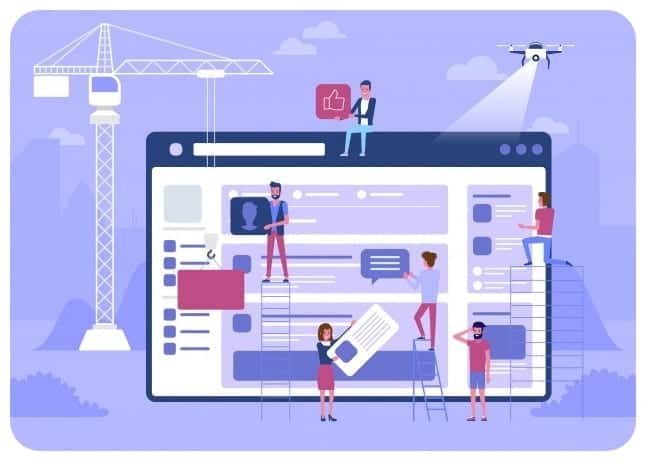 After UI, you’ll need to construct the front-end of your website.
After UI, you’ll need to construct the front-end of your website.
The front-end of your website is everything that a visitor can see and interact with, which is why comes after the user interface. It includes everything from pictures and multimedia to cursor style to registration buttons to login fields and processes.
You’ll want to build something that is both responsive and user-friendly, as well as something that is pleasing to the eye. This bit of construction can easily cost you several thousand dollars if you don’t have the skills or time to do it yourself.
Back-End Development
After front-end is, of course, back-end development. This involves writing all the software and other code necessary to make sure your site functions properly.
When someone puts in their login information, you need to have back-end website architecture in place to make sure the process completes smoothly. This also involves integrating your website with third-party services and data processing tools.
As such, it’s one of the most complex parts of the construction phase and can cost you over $3000 up to $15,000.
Features
The features you include on your site necessarily affect its total cost. Interactive media is one of the most important and engaging features you can provide for your site, and many companies included as a default option because it’s so good at keeping people on the site for longer.
Interactive media can be small video games, visuals that allow visitors to click on different options, or even interactive chat systems. However, interactive media is very time and resource-intensive, so it can easily cost up to $10,000.
You’ll also probably want to invest in a content management system if you aren’t posting on a predesigned platform like WordPress. Content management systems let you and your team add or edit information already in place on your site without having to change code. This can also cause several thousand dollars.
Additionally, each page you add to your website runs up the total overall cost of your project. It’s not uncommon for a page to cost $100 or more by itself depending on the content that fills it.
We mentioned e-commerce before, but once again, adding this functionality to your site seriously drives up the overall asking price. E-commerce features include payment processing systems, shopping carts, payment options, product pages, and also review pages where customers can leave their feedback.
You may need a lot of e-commerce content based on how many products you want to sell or display. As such, and e-commerce feature can run up to $20,000 or more depending on the size of the business.
Finally, many websites also make use of database integration tools or services. In a nutshell, these compile the data you gather on your visitors or clients and puts it into a single resource that can be retrieved by you or other people on your team or in your business.
It’s an imperative feature for many companies and serious online brands, so most companies end up adding several thousand dollars to their total cost just so they can secure database integration.
Using a Website Builder
 There are two primary options when it comes to constructing a new website: you can use the website builder, like WordPress or Wix, and construct your site using their predesigned elements and apparatus or you can come up with a custom site developed by yourself or another person or team skilled in this art.
There are two primary options when it comes to constructing a new website: you can use the website builder, like WordPress or Wix, and construct your site using their predesigned elements and apparatus or you can come up with a custom site developed by yourself or another person or team skilled in this art.
Using a website builder is by far the cheaper option, and access to the website builder is often included with many web hosting packages.
Website builders allow you to “drag-and-drop” different elements of a website page, like dialog boxes or content boxes, into place using a premade system or hanging system. They basically make the wireframe for your website and let you fill in the content or adjust different widgets or content boxes as you see fit.
It’s relatively intuitive and may only cost you up to a few hundred dollars in total. You may need to pay a few additional fees based on themes or media additions; each website builder is subtly different, and some are certainly better than others.
Note: There are quality free website builders but premium ones are mostly more useful
Using a Custom Site/Made By Developer
Alternatively, building a custom site that is made by a developer or web design agency is much more expensive.
Freelance web developers can be found relatively easily thanks to the plethora of freelance hiring websites and content networks available these days. Freelancers are independent contractors that build your website after being given a job proposal, and the amount they may demand for their services can vary wildly.
It’s not uncommon for freelancers to charge several thousand dollars for building a full website from scratch, with even higher prices if they have to plan and design the website as well.
In general, it’s a better idea to pay for more expensive freelancers that have a good variety of work under their belt or in their portfolio than it is to cheap out and hire an inexpensive freelancer that doesn’t know what they’re doing.
You can alternatively hire a web design agency. These are professional website building companies that work similarly to a freelancer; you give them a proposal and they work with you to iron out the details and build your website once you are satisfied. The advantage of using them over a freelancer is seen in time and detail.
Since they run a team of several dozen or hundred people, they can churn out larger and more complex websites much more quickly and efficiently than a freelancer working alone can.
The disadvantage is that they are much more expensive. Many upper-tier web design agencies charge into the tens of thousands or hundreds of thousands of dollars to build a website from scratch.
Of course, the last option is to develop your website yourself without using a website builder. This is theoretically totally free, but you still have to pay for server hosting and other elements. It also costs you quite a lot of time and may not be worth the effort if you don’t have the skills and expertise to make an excellent website, anyway.
Total Cost: Upwards of $10,000, depending on worker used and features implemented.
Hosting/Other Costs
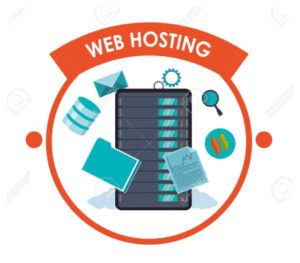 When you have your own website, you either need to have your own servers that connect to the Internet or, more commonly, use a web hosting service.
When you have your own website, you either need to have your own servers that connect to the Internet or, more commonly, use a web hosting service.
This allows other Internet users to access your website by storing your data on servers that are constantly connected to the web.
Hosting Service
You pay for web hosting services by essentially renting server space for a monthly or yearly fee. The type and quality of your website hosting service can affect many things, including:
- ☑️ your server resources, like storage space or bandwidth
- ☑️ your loading times for your visitors; better hosting services allow for more responsive page loading
- ☑️ widgets or add-ons that increase or expand your site functionality
All in all, your web hosting provider matters a great deal for the overall success and quality of your website endeavor. Website hosting can cost anywhere between $20 to several thousand dollars per year based on server resources needs. There are several basic types of web hosting services that we can break down:
Shared Hosting
This is the most basic type of web hosting and allows you to rent space that you share with other people on the same server. You don’t get a ton of bandwidth for server resources, but their subscription packages are usually very affordable and often come with website builders or other perks.
Among these, are the best hosting packages for small blogs or other websites that don’t need to provide top-tier performance for thousands of visitors all the time. Shared hosting services cost anywhere between $20 and $300 per year
WordPress hosting
You’ll often see designated “WordPress” hosting; this is the same thing as shared hosting, but with WordPress pre installed. These hosting packages often include extra perks or features for WordPress users specifically, and cost around the same price as shared hosting plans.
VPS Hosting (Virtual private server)
This type of hosting has you share server space with other clients but gives you extra resources from that server because of software magic – the server becomes separated into “virtual” servers for each user.
It’s essentially a good middle ground between having your own server and keeping costs lower like with a shared hosting service. These packages can cost between $200 and $700 per year.
Dedicated Hosting
Quality dedicated server hosting is the costliest out of all the options, but it gives your website or company their own server and all the resources that come with it. As such, these are the only real option for big online businesses or multimedia website that received thousands of visitors per day. Dedicated servers can cost between $1000 and $25,000 per year.
Domain
In addition to web hosting, you’ll need to consider the comparatively smaller fees for your domain name. In a nutshell, your domain is your website’s online identity that is specific to you and your brand alone. Your domain remains unique even though other websites can have names that are similar to yours.
To get this advantage, you need to purchase the domain name and register it annually. It’s important to have a domain name to maintain a solid brand on the Internet and establish credibility with both your visitors and with Google;
It ranks websites with their own domain names more competitively, making it a must-have feature for serious online businesses or websites looking to grow.
It also plays a big role when it comes to online advertising. Your domain name determines where visitors are directed when they click on your ads. Failing to secure your individual domain means they might go somewhere else, wasting those advertising dollars.
You can purchase and register a domain name from many of the same hosting companies that provide hosting services like we described above. Domain names cost anywhere between $1 to around $15 depending on the name’s popularity or the service you’re using.
Related: How to Buy a Domain Name
SSL
SSL, or Secure Sockets Layer, certification is one of the most important pieces of the website puzzle. SSL certification protects your website and your visitors by guarding their sensitive data.
It’s such a common and staple security measure that even shows up in the URL of your website, meaning any visitor who stopped by your site can see if your WordPress website is secured.
This is also important because the GDPR recently placed several restrictions on websites that do international commerce, but who don’t take effective steps to protect their users’ data.
You practically must-have SSL certification if you want to do business with customers in the EU and beyond these days. E-commerce website owners need to consider SSL certification cost a necessity of doing business.
Even if you aren’t an e-commerce site owner, you’ll benefit from the increased security that such certification brings.
SSL certificates can come from web hosting companies or from other vendors or services; it’s also possible to get SSL certification for free, though paid SSL certificates are usually better for overall security, like advanced encryption models.
SSL certificates can cost, therefore, $0 or up to $1000 per year, with bigger sites with greater security needs warranting higher costs.
Note: If security is a chief concern (as it should be), high-quality security plugins will make your life easier
Total Cost: $100 or so per month, up to $1000s of dollars per month.
SEO/Content
Even after building a website, it won’t be much use to anyone unless you fill it with content and make that content optimized for search engine visitors. This is where SEO, or search engine optimization, comes into play.
Written Content
 When you’re filling your site with content, the cost for doing so can vary based on the amount of content you need, as well as the quality and type of content.
When you’re filling your site with content, the cost for doing so can vary based on the amount of content you need, as well as the quality and type of content.
For instance, most websites have content either written by their owners are creators or written by professional freelance copywriters. Writing your own content is obviously free, but it can eat up a significant amount of time, especially when you consider research, formatting, and editing.
On the flip side, professional copywriters can be found either in a freelance capacity or as part of a dedicated copywriting agency. Copywriting delivered from a freelancer can be either extremely cheap or much more expensive depending on the quality you want.
Freelance copywriting paid for with bottom of the barrel prices is liable to be filled with typos or errors. Meanwhile, top-tier freelance copywriters charge more for every page of content they create, but they usually come with added links, search engine optimization, and intelligent keyword lacing throughout the content.
All of this can make that content more attractive to Google search ranking algorithms and more effective at drawing in visitors for your website.
Copywriting agencies have teams of writers that work together on content for websites. This makes them a much better choice if you need to fill up a larger website with dozens of pages in a much shorter time frame.
All in all, professional copywriting from either a freelancer or from a copywriting agency will cost you anywhere between $20-$500 per page based on the type and quantity of content. Be sure to take this into account when calculating your final website cost.
Other Content
Furthermore, if you need to make videos, music or other content for your website, you’ll need to take these costs into account as well. The cost to make a video is essentially uncountable because of the myriad factors that go into making videos.
SEO
 Search engine optimization entails coming up with content that intelligently uses searched-for keywords without coming across as robotic; this practice is often called “keyword stuffing”.
Search engine optimization entails coming up with content that intelligently uses searched-for keywords without coming across as robotic; this practice is often called “keyword stuffing”.
Writing your content in an engaging way and lacing links, both to your own pages and products and to other websites with whom you form of visitor network, can help your website appear more attractive to Google search results algorithms and help you gain visitors this way.
Search engine optimization also extends the page placement and website development. As such, there are copywriters or other website developers who have search engine optimization skill sets and they may charge you to use these on your website. For example, image optimization or file compression.
This can cost anywhere between $700 to several thousand dollars per month; it’s more expensive if you constantly add new content and want to remain relevant and it’s less expensive if you don’t update your site all that frequently.
Of course, you can do your search engine optimization yourself. But bear in mind that this may take a significant amount of time, especially if you do so in conjunction with writing your own copy.
Total Cost: $100 per page up to $500 per page when factoring content, SEO, linking, etc.
Marketing
Once you have your site up and running and have filled it with content, odds are good that you’ll need to spend some time marketing your site for you to get enough visitors to trip the Google search algorithms and push your site to the front page. This involves content marketing, social media marketing, and email marketing.
Content Marketing
Advertising your blog posts or other content directly to your target audience by way of interlinking with similar sites or advertising your content through other means, like banner ads.
You can hire a content marketing service or spend your own advertising dollars getting word of your site out on the wider Internet for several thousand dollars per month, all the way up to $10,000 if you run a truly large site with tons of content.
Social Media Marketing
Both simpler and more affordable; it involves either hiring someone to do the marketing for you or doing it yourself.
Either way, you or your social media marketer will spend time on platforms like Facebook, Twitter, and more engaging with your followers and bringing in new followers to drive visits to your site and create higher conversion rates. If you choose to hire someone to do this for you, social media marketing can cost several hundred up to $2000 per month.
Email Marketing
The cheapest option, though it often requires that your website has a newsletter or email list functionality. With quality email marketing services, you send out a weekly or monthly newsletter or email showcasing your new content or advertising for your site. This can cause you only a few bucks per month up to $1000 per month if you go about a truly massive email marketing campaign.
Total Cost: $300-$1000s of dollars depending on marketing reach.
Maintenance
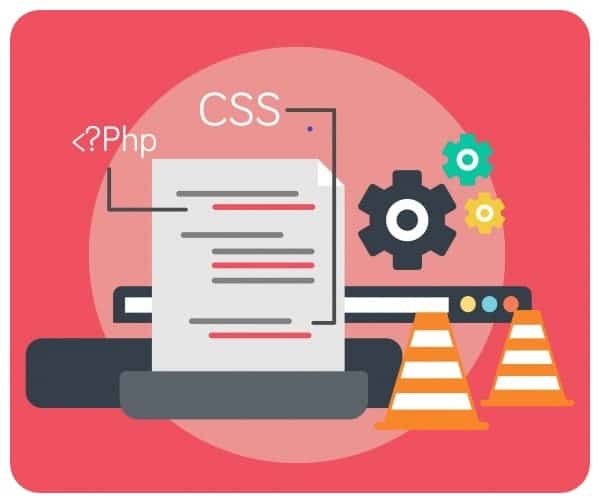 Building your site and filling it with quality content is only part of the battle. You also need to maintain your website over the long-term, which involves keeping them functioning and keeping your visitors happy while avoiding as much downtime as possible.
Building your site and filling it with quality content is only part of the battle. You also need to maintain your website over the long-term, which involves keeping them functioning and keeping your visitors happy while avoiding as much downtime as possible.
Remember, if your website goes down, that’s valuable time in which you could be getting visitors and conversion!
The good news is that website maintenance is one of the lower expenses compared to all the other factors involved in developing a site. Website maintenance can extend to:
- ☑️ acquiring new server resources as your traffic spikes
- ☑️ switching servers for a higher capacity server if your website grows successfully
- ☑️ performing regular debugging or security updates
- ☑️
- in case of a server crash
- ☑️ handling busywork or customer complaints
All told, you or your team can expect to pay several hundred dollars up to $1500 per year for all your website maintenance needs. Note that your overall maintenance costs may go up dramatically if you need to switch servers for hosting providers quickly or during an emergency or if your servers or website need immediate repairs because of a cyber-attack.
The costs may be even higher if a hacker manages to get a hold of sensitive user data and causes serious damage to your site, requiring reconstruction.
Total Cost: $200-$1500 per year depending on website size, server needs, etc.
Summary
As you can see, narrowing down the costs you should expect to pay for building and maintaining a website is incredibly complicated. It depends on a myriad of factors, including:
- ☑️ your personal skill level
- ☑️ the type of website you want to create
- ☑️ the amount of content you want to put on the website
- ☑️ the server resources you need for the site
- ☑️ how many visitors the site gets
- ☑️ how much maintenance the site requires
For example, if your website isn’t gonna be that big, you can get away with some top-of-the-line cheap hosting and reduce the expenses considerably. To that end, it’s often smarter to calculate averages for your website costs based on their size and type. We’ve done a breakdown for you below.
Small Business Website/Blog
- ☑️ Expect to pay at least $500-$10,000 initially. This includes accounting for doing some things yourself
- ☑️ Expect to pay between $200 and $1000 per year for annual maintenance costs.
Ecommerce Website
- ☑️ Expect to pay up to $3000 for stores with around 100 products.
- ☑️ And upwards of $20,000-$30,000 for stores with more than 500-1000 products.
- ☑️ Expect to pay between $5000 and $20,000 for annual maintenance costs.
Corporate/Big Business Website
- ☑️ Expect to pay between $10,000 and $40,000 for quality sites to drive business and conversion rates, and marketing.
- ☑️ Expect to pay between $2000 and $20,000 for annual maintenance costs.
Database Driven Website
- ☑️ Expect to pay between $5000 and $50,000 for initial site construction and data compilation/collection.
- ☑️ Expect to pay between $10,000 and $60,000 for annual maintenance costs, including additional security and server maintenance to protect users’ data.
Ultimately, the cost of your website will depend heavily on the type of help you hire, the quality you want for your website, and how much time you are willing to sink in yourself in terms of design, planning, and coding.
You can always drive down the price by the more of the work with your own effort or by looking for great deals on things like hosting services or using a website builder. Use the above amounts as general guidelines and ranges rather than hard and fast rules, especially since the web development industry is constantly changing.
Thanks for reading and good luck!





